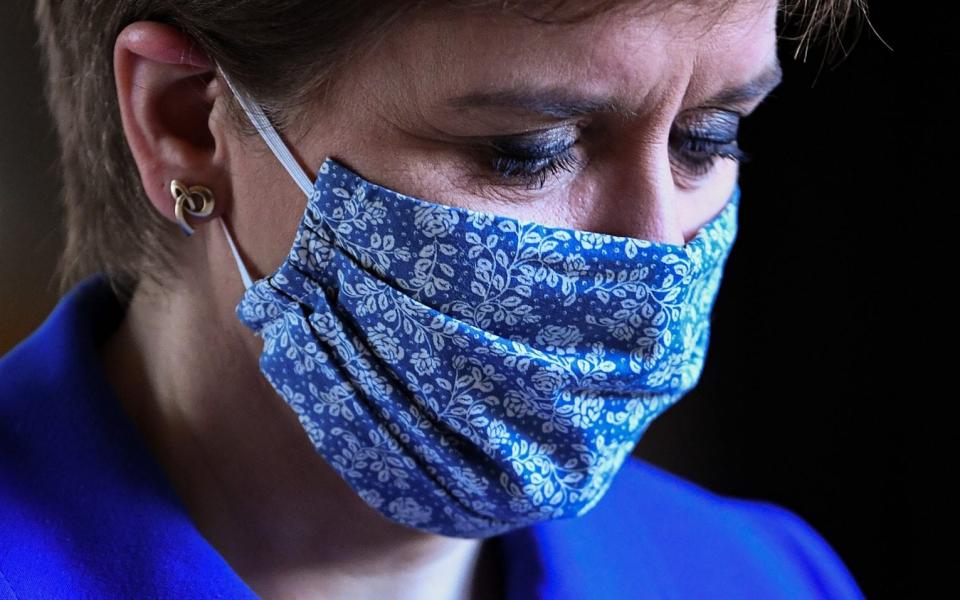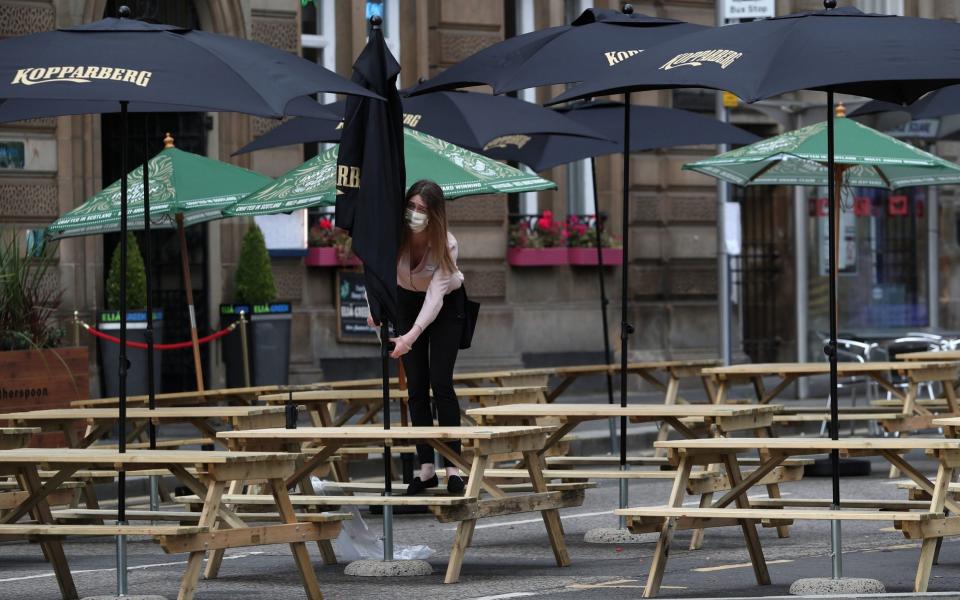Nicola Sturgeon goes further than Boris Johnson by banning indoor visits to other households in Scotland

Nicola Sturgeon has barred Scots from indoor visits to other homes for up to six months as she imposed harsher lockdown restrictions than Boris Johnson in England to tackle the second wave of coronavirus.
The SNP leader copied the Prime Minister's decision south of the Border to impose a 10pm curfew on pubs and restaurants from Friday in an attempt to "align as far as possible with the rest of the UK."
But she said her medical advisers had told her this was not "on a significant scale enough" to stop the surge in cases in recent weeks and tough measures were needed to cut household transmission.
The First Minister said a ban on indoor visits to other households that already applied to 1.75 million people in the west of Scotland will be rolled out nationally from Friday.
However, she asked Scots to voluntarily adhere to the ban from Wednesday and warned that further local and national restrictions may be required in the coming weeks.
Ms Sturgeon said she was keeping under review the imposition of a 'circuit breaker' lockdown in the October half term - a short but extreme shutdown designed to have a sharp impact on breaking the chain of transmission.
The First Minister insisted she shared the "despair" her announcement would cause many Scots but insisted "this will give us the best chance of avoiding tougher or longer lasting measures later."

Her lockdown plan means that friends and families can continue to meet outdoors or in pubs, subject to a limit of six people from two households, but not in each other's homes.
Exceptions will be made for those living alone or single parents who form extended households, couples who live apart, "informal" childcare from people such as grandparents and tradesmen.
Her statement to the Scottish Parliament came shortly after Mr Johnson announced new restrictions in England but no ban yet on visiting other households. He warned they would be in place for six months.
The First Minister that she hoped her new measures could be lifted before next spring but provided no guarantees. They will be reviewed in three weeks but she warned "they may be needed for longer than that."
Scotland's beleaguered hospitality industry warned it was now "staring into the abyss" as business leaders demanded that UK and Scottish ministers provide more financial support, with furlough due to end next month.
Among Ms Sturgeon's other announcements were:
Businesses face a legal duty to allow home working if they fail to comply with Scottish Government advice.
Children are being removed from the two-household limit on gatherings.
Those with medical conditions that make them vulnerable to the virus do not need to return to shielding.
Scots should not book overseas travel in the October holidays or share cars with people from other households.
Ms Sturgeon imposed her new restrictions as Scotland recorded 383 new cases of coronavirus and another death. The R number - the average number of people each carrier infects - is as high as 1.4.
The proportion of tests coming back positive surged to 7.6 per cent, well above the World Health Organisation's five per cent threshold for the virus being under control.

Speaking after joining a Cobra meeting with the Prime Minister and the other devolved leaders, Ms Sturgeon noted that Scotland was recording an average of only nine cases a day in mid-July and the test positivity rate was "consistently" below one per cent in late August.
She said this surge was "faster than we can be comfortable with" and all four governments had committed at Cobra "to suppressing the virus to the lowest possible level and keeping it there".
But she said the advice by her chief medical officer and national clinical director was that restrictions on hospitality "on its own will not be sufficient".
"They stress that we must act, not just quickly and decisively, but also on a scale significant enough to have an impact on the spread of the virus," she said.
"And they advise that we must take account of the fact that household interaction is a key driver of transmission."
732,500 people in Scotland have been tested for #coronavirus
The total confirmed as positive has risen by 383 to 25,009
Sadly 1 more patient who tested positive has died (2,506 in total)
Latest update ➡️ https://t.co/bZPbrCoQux
Health advice ➡️ https://t.co/l7rqArB6Qu pic.twitter.com/ypzy5d8axn— Scottish Government (@scotgov) September 22, 2020
Ms Sturgeon said she would copy Northern Ireland by banning indoor visits to other households and argued this had succeeded in slowing the rise in cases in the west of Scotland.
"So if we extend it nationwide now, in an early and preventative way, we hope it will help to bring the R number down and the virus back under control," she said.
The First Minister said the 10pm hospitality curfew aimed to "find a balance between action to suppress the virus and the protection of people’s jobs and livelihoods".
She suggested she would have shut pubs altogether if she had greater borrowing powers or the ability to extend the furlough scheme.
But she warned the trade that "further restrictions, including possible closure, will be unavoidable" if rules on hygiene, face coverings, table service and social distancing are not observed.
Children under 12 are already exempt from the ban on gatherings of more than six people, but Ms Sturgeon said they would also be removed from the two-household limit.
Those aged 12 to 18 will also be exempt from the latter but the 'rule of six' will continue to apply to them.

